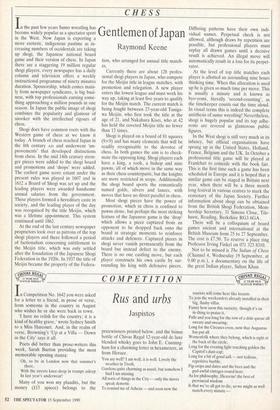CHESS
Gentlemen of Japan
Raymond Keene
n the past few years Sumo wrestling has become widely popular as a spectator sport in the West. Now Japan is exporting a more esoteric, indigenous pastime as in- creasing numbers of occidentals are taking up shogi, the Japanese national board game and their version of chess. In Japan there are a staggering 19 million regular shogi players, every newspaper has a daily column and television offers a weekly instructional programme of ninety minutes duration. Sponsorship, which comes main- ly from newspaper syndicates, is big busi- ness, with top professionals earning some- thing approaching a million pounds in one season. In Japan the public image of shogi combines the popularity and glamour of snooker with the intellectual rigours of chess.
Shogi does have common roots with the Western game of chess as we know it today. A branch of chess reached Japan in the 8th century AD and underwent 'im- provements' that developed distinctions from chess. In the mid 14th century stron- ger pieces were added to the shogi board and promotions and 'drops' were added. The earliest game score extant under the present rules was played in 1607 and in 1612 a Board of Shogi was set up and the leading players were awarded handsome annual salaries from the government. These players formed a hereditary caste in society, and the leading player of the day was recognised by the title Meijin, which was a lifetime appointment. This system continued until 1862.
At the end of the last century newspaper proprietors took over as patrons of the top shogi players and there followed a period of factionalism concerning entitlement to the Meijin title, which was only settled after the foundation of the Japanese Shogi Federation in the 1920s. In 1937 the title of Meijin became the property of the Federa- tion, who arranged for annual title match- es.
Currently there are about 128 profes- sional shogi players in Japan, who compete for the Meijin title in league matches, with promotion and relegation. A new player enters the lowest league and must work his way up, taking at least five years to qualify for the Meijin match. The current match is being fought between 27-year-old Taniga- wa Meijin, who first took the title at the age of 21, and Nakahara Kisei, who at 42 has held the coveted Meijin title no fewer than 12 times.
Shogi is played on a board of 81 squares (9x9) and has many elements that will be readily recognisable to the devotee of chess. In both games the aim is to check- mate the opposing king. Shogi players each have a king, a rook, a bishop and nine pawns, all of which move in the same way as their chess counterparts, but the knights are more restricted in scope. Additionally the shogi board sports the romantically named golds, silvers and lances, with moves that have no direct parallel in chess.
Most shogi pieces have the power of promotion, which in chess is confined to pawns alone, but perhaps the most striking feature of the Japanese game is the 'drop' which allows a piece captured from an opponent to be dropped back onto the board at strategic moments to reinforce attacks and defences. Captured pieces in shogi never vanish permanently from the board but instead defect to the enemy. There is no one castling move, but each player constructs his own castle by sur- rounding his king with defensive pieces. Differing patterns have their own indi- vidual names. Perpetual check is not allowed, although draws by repetition are possible, but professional players must replay all drawn games until a decisive result is achieved. An illegal move will automatically result in a loss for its perpet- rator.
At the level of .top title matches each player is allotted an astounding nine hours thinking time. When this allocation is used up he is given so much time per move. This is usually a minute and is known as byo-yomi, literally `second-counting', as the timekeeper counts out the time aloud. In visual terms this is indeed the complete antithesis of sumo wrestling! Nevertheless, shogi is hugely popular and its top adhe- rents are revered as glamorous public figures.
In the West shogi is still very much in its infancy, but official organisations have sprung up in the United States, Holland, France, Belgium and the UK. In October a professional title game will be played at Frankfurt to coincide with the book fair. This is the first time such a game has been scheduled in Europe and it is hoped that a similar game can be staged in Britain next year, when there will be a three month long festival in various centres to mark the centenary of the Japan Society. Further information about shogi can be obtained from the British Shogi Federation, Mem- bership Secretary, 31 Simons Close, Tile- hurst, Reading, Berkshire RG3 6GA.
There will be a colloquium of board games ancient and international at the British Museum from 25 to 27 September. The cost is £7.50. To reserve a place ring Professor Irving Finkel on 071 323 8310.
Not to be missed is The Sultan of Chess (Channel 4, Wednesday 19 September, at 9.00 p.m.), a documentary on the life of the great Indian player, Sultan Khan.


























































 Previous page
Previous page